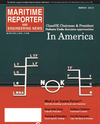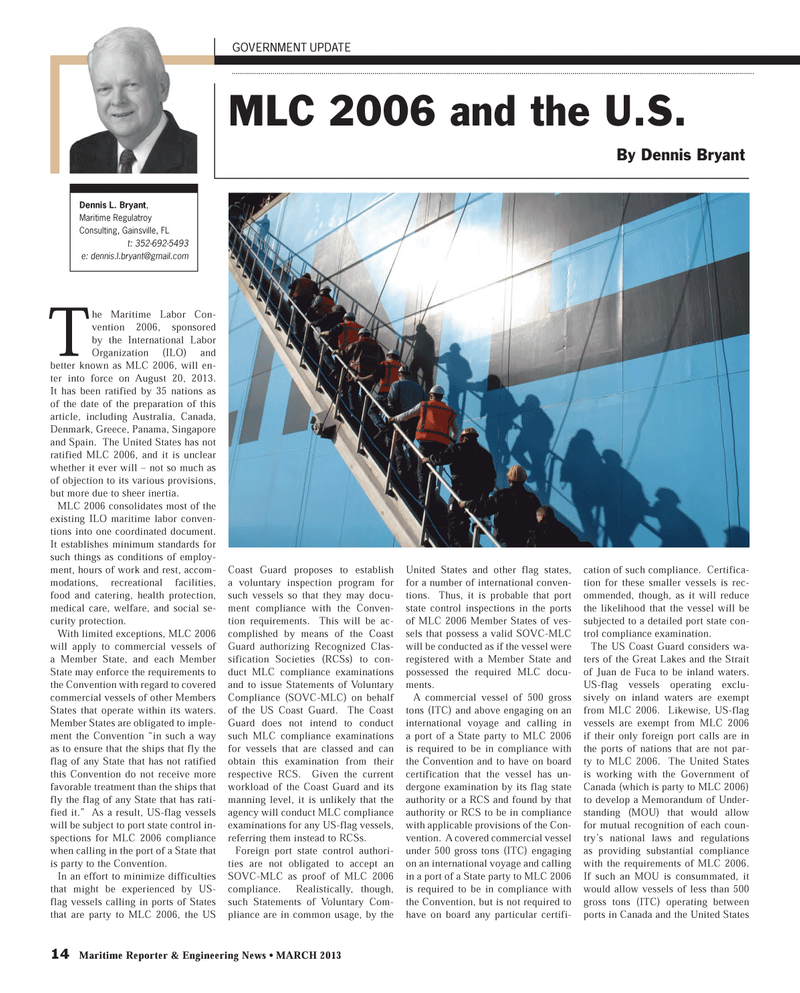
Page 14: of Maritime Reporter Magazine (March 2013)
U.S. Coast Guard Annual
Read this page in Pdf, Flash or Html5 edition of March 2013 Maritime Reporter Magazine
14 Maritime Reporter & Engineering News ? MARCH 2013 GOVERNMENT UPDATE MLC 2006 and the U.S.By Dennis Bryant Dennis L. Bryant, Maritime Regulatroy Consulting, Gainsville, FLt: 352-692-5493e: [email protected] Maritime Labor Con-vention 2006, sponsored by the International Labor Organization (ILO) and better known as MLC 2006, will en-ter into force on August 20, 2013. It has been ratified by 35 nations as of the date of the preparation of this article, including Australia, Canada, Denmark, Greece, Panama, Singapore and Spain. The United States has not ratified MLC 2006, and it is unclear whether it ever will ? not so much as of objection to its various provisions, but more due to sheer inertia. MLC 2006 consolidates most of the existing ILO maritime labor conven-tions into one coordinated document. It establishes minimum standards for such things as conditions of employ-ment, hours of work and rest, accom-modations, recreational facilities, food and catering, health protection, medical care, welfare, and social se-curity protection. With limited exceptions, MLC 2006 will apply to commercial vessels of a Member State, and each Member State may enforce the requirements to the Convention with regard to covered commercial vessels of other Members States that operate within its waters. Member States are obligated to imple-ment the Convention ?in such a way as to ensure that the ships that fly the flag of any State that has not ratified this Convention do not receive more favorable treatment than the ships that fly the flag of any State that has rati-fied it.? As a result, US-flag vessels will be subject to port state control in-spections for MLC 2006 compliance when calling in the port of a State that is party to the Convention. In an effort to minimize difficulties that might be experienced by US-flag vessels calling in ports of States that are party to MLC 2006, the US Coast Guard proposes to establish a voluntary inspection program for such vessels so that they may docu-ment compliance with the Conven-tion requirements. This will be ac- complished by means of the Coast Guard authorizing Recognized Clas-sification Societies (RCSs) to con-duct MLC compliance examinations and to issue Statements of Voluntary Compliance (SOVC-MLC) on behalf of the US Coast Guard. The Coast Guard does not intend to conduct such MLC compliance examinations for vessels that are classed and can obtain this examination from their respective RCS. Given the current workload of the Coast Guard and its manning level, it is unlikely that the agency will conduct MLC compliance examinations for any US-flag vessels, referring them instead to RCSs. Foreign port state control authori-ties are not obligated to accept an SOVC-MLC as proof of MLC 2006 compliance. Realistically, though, such Statements of Voluntary Com- pliance are in common usage, by the United States and other flag states, for a number of international conven-tions. Thus, it is probable that port state control inspections in the ports of MLC 2006 Member States of ves-sels that possess a valid SOVC-MLC will be conducted as if the vessel were registered with a Member State and possessed the required MLC docu-ments. A commercial vessel of 500 gross tons (ITC) and above engaging on an international voyage and calling in a port of a State party to MLC 2006 is required to be in compliance with the Convention and to have on board certification that the vessel has un-dergone examination by its flag state authority or a RCS and found by that authority or RCS to be in compliance with applicable provisions of the Con-vention. A covered commercial vessel under 500 gross tons (ITC) engaging on an international voyage and calling in a port of a State party to MLC 2006 is required to be in compliance with the Convention, but is not required to have on board any particular certifi-cation of such compliance. Certifica-tion for these smaller vessels is rec-ommended, though, as it will reduce the likelihood that the vessel will be subjected to a detailed port state con-trol compliance examination. The US Coast Guard considers wa-ters of the Great Lakes and the Strait of Juan de Fuca to be inland waters. US-flag vessels operating exclu-sively on inland waters are exempt from MLC 2006. Likewise, US-flag vessels are exempt from MLC 2006 if their only foreign port calls are in the ports of nations that are not par- ty to MLC 2006. The United States is working with the Government of Canada (which is party to MLC 2006) to develop a Memorandum of Under- standing (MOU) that would allow for mutual recognition of each coun-try?s national laws and regulations as providing substantial compliance with the requirements of MLC 2006. If such an MOU is consummated, it would allow vessels of less than 500 gross tons (ITC) operating between ports in Canada and the United States MR #3 (10-17).indd 14MR #3 (10-17).indd 142/26/2013 3:39:23 PM2/26/2013 3:39:23 PM

 13
13

 15
15
